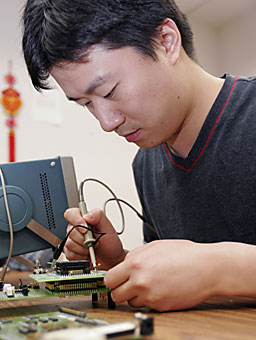 |
|
KEVIN B. KLAUS/Arizona Daily Wildcat
|
Computer engineering graduate student Jeff Peng debugs a programmable board last Thursday in the Electrical and Computer Engineering building.
|
|
|
By Cassie Blombaum
Arizona Daily Wildcat
Tuesday, February 1, 2005
Print this
Mining engineering is in great demand, and not many UA students are taking advantage of it.
Last year alone, five students graduated from the department of mining and geological engineering.
However, with starting salaries averaging at about $55,000 and reaching as high as $80,000 immediately after graduation, Mary Poulton, department head and professor of mining and geological engineering, believes that is all about to change.
Because of newly released information about considerably high salaries that can be made in the field, the department has seen an upsurge in student interest in mining engineering, Poulton said.
"We are getting a lot of inquiries, and I believe we will see our enrollments increase as students learn about the opportunities and what the careers are really like," Poulton said.
However, because of the profession's high demand, attention still needs to be brought forward to promote the field's importance.
According to Poulton, the demand is driven by two main factors.
The first is that a large number of mining engineers are nearing retirement and must be replaced, Poulton said.
The second is that the increase in industrialization and the higher standard of living in China and other countries. This has led to a higher demand for materials and current production rates of these materials cannot keep pace, Poulton said.
Despite the field's rising demand and unusually high starting salaries, Poulton said there still seems to be a lack of students cashing in on the opportunity.
There are 30 undergraduate and 26 graduate students in the program, and about 10 percent of them are women, Poulton said. According to Poulton, the number of women in the field is higher nationally.
"It is actually a very good career for women, and we are trying to recruit more," said Poulton.
Mining engineering is not only unique, but also important to the foundation of nations, said Poulton.
"Mining engineers provide the basic materials we demand and require in our daily lives, from the materials for our houses and roads to our cars, computers, bicycles and books," said Poulton.
Tom O'Neil, former mining engineering department head, past president of the Tucson chapter of the National Society for Mining Metallurgy and Exploration, and former chief operating officer of Cleveland-Cliffs Mining Company, also said the field is not clearly understood.
"The highly technical nature of mining today is not well understood by the public. We simply could not operate today without advanced computer systems on mathematical modeling of ore bodies," O'Neil said. "The pick and shovel may provide a little nostalgia, but they don't have a place in mining today."
Poulton said stereotypes of the career include the assumption that miners are in caves digging and picking, which are untrue since most work is now done on computers.
Poulton said she not only hopes that the stereotypes for mining engineering decreases but also wants to see a jump in student numbers within the department.
"We want to increase the number of undergraduates by 50 percent per year for the next couple of years, and we want to increase the number of graduate students as well," Poulton said.
Some UA alumni from the department are already enjoying the benefits of the career.
Jarrett Munkittrick, plant supervisor at Vulcan Materials Company, graduated from the department of mining and geological engineering in 2001. He emphasized the importance of the department.
"You really only get out of it what you put into it. The UA's department of mining engineering allows you to maximize the return on your investments of time and energy," Munkittrick said. "The program ... provides students with a solid foundation of technical knowledge about geology, mining operations and the mining industry."
Erron Winsor, a mining and geological engineering sophomore, said he feels lucky to be in the field.
"I joined it because it was a small family," Winsor said. "When I walked into the department and the professors knew my name, it blew me away."
Poulton said the opportunities are very diverse and students who graduate with a degree in mining and geological engineering can end up working for successful mining companies like Phelps Dodge and Barrick, as well as industrial mineral companies like U.S. Gypsum.
O'Neil said that in addition to learning in a close student-teacher environment, the opportunities for students who graduate in mining engineering are extensive.
"Because mining is an extremely capital-intensive business, many mining engineering grads ultimately end up in management and finance," O'Neil said.
In addition to great occupations following graduation, students can also expect to work in a variety of nations throughout the world, Poulton said.
"Our alums have worked in Russia, Mongolia, Indonesia, Tanzania, Chile, Peru, Argentina, Bolivia and just about every other country in the world," Poulton said.
The economy could also benefit tremendously if a greater number of people joined the field. When asked whether or not the lack of mining engineers could be a detriment to our economy, Poulton said the U.S. Congress has been "investigating it very seriously."
Jack Thompson, vice chair of Barrick, a leading gold mining company, agreed that a shortage in mining engineers could impact the nation's economy.
"Natural resources are the foundation of the high standard of living we enjoy in the United States. We will have to find the professionals needed somewhere," Thompson said.
On the other hand, O'Neil said it might be "overly drastic to claim that a mining shortage would damage the U.S. economy."
"The danger is that because of our advanced economy, few people recognize how much we still rely on mining," O'Neil said. "Our consumption of minerals keeps rising in spite of conservation and recycling. (However) our cost of living has certainly gone up due to our growing reliance on imports."
